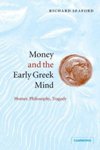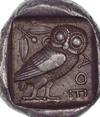
I’ve been reading Richard Seaford’s Money and the Early Greek Mind: Homer, Philosophy, Tragedy.
Seaford’s theme: “the monetisation of the Greek polis in the sixth and fifth centuries BC contributed to a radical transformation in thought that is, in a sense, still with us. Academics—perhaps because they are more interested in texts than in money—have emphasized rather the role of alphabetic literacy in the radical intellectual changes of this period.” (p. xi)

He then notes a striking coincidence: “The earliest surviving texts in the Greek alphabet were written shortly before and concurrently with the monetization of the city-states.” (p. 10)
Both alphabetic literacy and money involve parallel leaps of abstraction:
* Written texts are abstract representations of knowledge that are portable, easily transmittable among many people, and good for long-term storage.

* Money is an abstract representation of wealth that is portable, easily transmittable among many people, and good for long-term storage.
Money is to the economic realm what texts are to the intellectual realm: empowering tools. Cultures that develop literacy become smarter and more knowledgeable. Cultures that develop money become more productive and wealthier.
So I wonder if there is a deep, common connection in the ancient Greek culture that led to both great innovations’ developing at almost the same time.
[Images: The text is a very early Greek alphabet. Source: The Schoyen Collection. The coin is an Athenian “owl” from around 450 BCE. Source: Money Museum.]
Related: Aristotle’s Nicomachean Ethics, in the Philosophers, Explained series.
Innovations are are result of pressure to solve problems remember, as populations scale geometrically new problems crop up and contradictions form, money and literacy are merely solutions to contradictions that would have occured given large enough populations of human beings. To put it another way – if it wasn’t the greeks it would have been someone else.